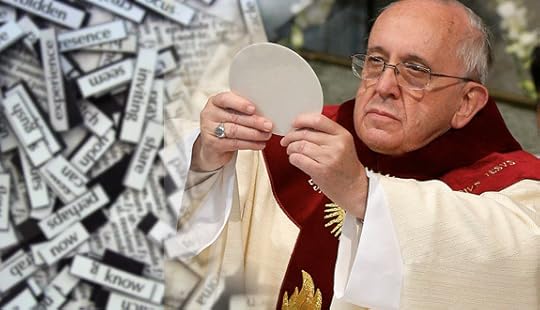A Word About Words—and 2013

A Word About Words—and 2013 | Carl E. Olson | Editorial | Catholic World Report
Our world is full of promises, plans, policies, and pleas, making it hard to hear just one Word
“Everything is simpler than you think,” wrote Goethe, “and at the same time more complex than you imagined.”
Those are words worth keeping in mind when trying to assess a particular stretch of time such as The Year of 2013. Any such assessment or summary is fraught with inevitable challenges, one of them expressed many centuries ago, according to the Oxford English Dictionary, as follows: “I see, ye can not see the wood for trees.”
Or, in the words of the great philosopher and martial artist Morpheus: “The Matrix is everywhere. It is all around us. Even now, in this very room. You can see it when you look out your window or when you turn on your television. You can feel it when you go to work... when you go to church... when you pay your taxes. It is the world that has been pulled over your eyes to blind you from the truth.”
Granted, there are serious problems, to state the obvious, with the pseudo-Buddhist and neo-gnostic premises of The Matrix. My point is that we are so deeply immersed in a particular time, place, culture, and sea of rhetorical cues and influences, that we—to mix my metaphors in order to stir my editorial drink—struggle to see the forest for the trees. To remake another famous epigram, if a tree stands in a forest, and no one can see the forest, is the tree really standing?
When I think back on the past year, I am struck, again and again, by the power of words. It's not simply because I work with words, but because words shape and direct our lives far more than we might ever be able to fathom, whether they are the words of politicians and popes, or the utterances of reporters and celebrities.
Language is powerful. In the words of the great philosopher Josef Pieper, in his short and brilliant book, Abuse of Language, Abuse of Power (Ignatius, 1992):
Word and language, in essence, do not constitute a specific or specialized area; they are not a particular discipline or field. No, word and language form the medium that that sustains the common existence of the human spirit as such. The reality of the word in eminent ways makes existential interaction happen. And so, if the word becomes corrupted, human existence itself will not remain unaffected and untainted. ... words convey reality. We speak in order to name and identify something that is real, to identify it for someone, of course ...
A few pages later, Pieper noted, “Public discourse itself, separated from the standard of truth, creates on its part, the more it prevails, an atmosphere of epidemic proneness and vulnerability to the reign of the tyrant”. Apply that to current events as you wish, but have no doubts about how applicable it really is. And I would suggest that the past year demonstrated there are plenty of tyrants to found, not the least of them the ancient tyrants of cynicism, despair, and fear.
Trust me, as I speak from personal experience. I've found it quite difficult, at times, to stave off the assaults of cynicism, which has been helpfully defined in one dictionary as “an attitude of scornful or jaded negativity, especially a general distrust of the integrity or professed motives of others.” I've found that the line between healthy skepticism and cynicism can be incredibly thin.
Which is one reason, frankly, that I've not yet written too much about the furor and controversies over the Most Discussed But Least Read Papal Text in Recent Memory: Evangelii Gaudium (oops—I think my cup of cynicism is already spilling onto the page). First, I am as shocked as anyone that Pope Francis wrote a 52,000-word long document about the economy. What was he thinking? Lest you think I'm merely being snarky—I am, but not merely—it should be noted that the Apostolic Exhortation is indeed all about the most important economy of all: the economy of salvation. (After all, it is titled, “The Joy of the Gospel,” not “The Failure of Free Markets”.)
Blessed John Paul II, in Redemptoris Missio, his 1990 encyclical on the Church's missionary mandate, wrote:
Carl E. Olson's Blog
- Carl E. Olson's profile
- 20 followers



